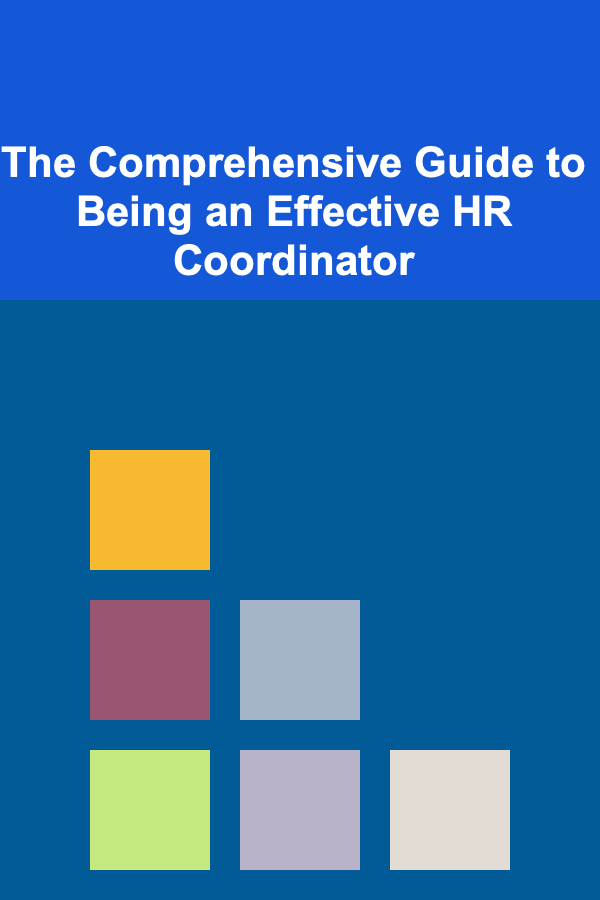
The Comprehensive Guide to Being an Effective HR Coordinator
ebook include PDF & Audio bundle (Micro Guide)
$12.99$6.99
Limited Time Offer! Order within the next:

Human Resources (HR) coordinators play an integral role in the smooth operation of any organization. From managing recruitment and employee relations to overseeing payroll and benefits, an HR coordinator is essential in ensuring that HR processes run efficiently. This guide will provide actionable insights on how to become an effective HR coordinator, enhance your skills, and streamline processes to contribute meaningfully to your organization.
Understanding the Role of an HR Coordinator
An HR coordinator supports the daily operations of the HR department, working closely with both management and employees to ensure that HR activities align with company goals. The role is highly varied, and it can include administrative duties, employee relations, recruitment, training, and compliance.
Key responsibilities include:
- Recruitment and Onboarding: Assisting in the hiring process, from posting job openings to coordinating interviews and onboarding new hires.
- Employee Records Management: Maintaining employee records and ensuring that all data is up to date and compliant with labor laws.
- Benefits and Payroll: Assisting with managing employee benefits programs and payroll systems.
- Compliance: Ensuring that the company adheres to labor laws, health and safety regulations, and internal policies.
- Employee Engagement: Supporting initiatives that foster a positive workplace culture and enhance employee satisfaction.
To excel as an HR coordinator, you must have a strong understanding of both administrative tasks and interpersonal skills to handle sensitive issues effectively. Here's how you can become more effective in your role.
Master the Administrative Functions
One of the primary duties of an HR coordinator is to handle various administrative tasks that keep the HR department running smoothly. The following skills will ensure you are organized and efficient in this aspect of your job.
2.1 Develop Expertise in HR Software
Modern HR departments rely heavily on technology to manage tasks such as payroll, recruitment, and employee records. Familiarity with various HR software platforms, such as HRIS (Human Resource Information Systems) and payroll software, is essential.
- HRIS systems like BambooHR or Workday allow HR coordinators to maintain accurate employee records and track key data, such as attendance and performance.
- Payroll systems like ADP or Paychex help manage payroll schedules, taxes, and benefits administration.
Becoming proficient with these tools not only makes your job easier but also helps reduce human errors and increase efficiency.
2.2 Maintain Employee Records
As an HR coordinator, managing employee data is one of your key responsibilities. It's essential to ensure that employee records are up to date, compliant with regulations, and easily accessible when needed.
- Ensure Accuracy: Regularly update personal information, job titles, compensation details, and performance reviews.
- Comply with Privacy Laws: Follow data protection regulations (like GDPR or HIPAA) to safeguard sensitive information.
Having well-organized, accurate employee records is critical not only for administrative efficiency but also for compliance with labor laws.
2.3 Streamline Onboarding Processes
Onboarding is an important part of employee retention. A smooth and comprehensive onboarding process sets the tone for new hires and makes them feel welcomed and informed.
- Create an Onboarding Checklist: Prepare a checklist for new hires to ensure they complete all necessary paperwork, such as tax forms and benefit enrollments.
- Provide Resources: Offer materials or sessions on company culture, policies, and procedures to help new employees understand your organization.
- Follow-up: Schedule regular check-ins with new hires to ensure they are adjusting well and address any concerns they may have.
By streamlining the onboarding process, you create a positive experience for new employees, which can lead to higher job satisfaction and retention rates.
Build Strong Communication Skills
Effective communication is crucial in HR. HR coordinators must regularly interact with employees, managers, and external parties, such as vendors and contractors. To be successful, you must master both verbal and written communication skills.
3.1 Active Listening
Active listening is a critical skill for an HR coordinator. You'll often handle sensitive issues, such as employee grievances, conflicts, or complaints. Demonstrating that you are truly listening to employees helps build trust and rapport.
- Listen attentively: Avoid distractions and focus on the person speaking.
- Ask clarifying questions: Show that you are interested in understanding the situation fully.
- Provide feedback: Restate key points to confirm understanding and show empathy.
Active listening creates a supportive environment where employees feel heard, which can lead to more productive and positive relationships.
3.2 Writing Clear, Concise Communication
As an HR coordinator, you will need to write various types of communication, from emails to company newsletters. It's essential to communicate in a clear and concise manner, especially when dealing with policies, procedures, and legal information.
- Be Direct but Respectful: Ensure that your messages are clear, straightforward, and professional.
- Use Bullet Points and Headings: Break up long paragraphs to make your messages more digestible.
- Proofread: Always review your communication before sending it out to avoid errors.
Clear written communication helps reduce misunderstandings and ensures that your messages are professional and effective.
Master Employee Relations
An HR coordinator plays a significant role in fostering a positive work environment. Your ability to manage employee relations can directly impact employee morale, productivity, and retention.
4.1 Conflict Resolution
Disputes and conflicts are inevitable in any workplace. Your role as an HR coordinator involves mediating and resolving conflicts between employees or between employees and management.
- Remain Neutral: Always approach conflicts without bias and ensure that all parties involved are heard.
- Follow Protocols: Understand the company's policies regarding conflict resolution and adhere to them.
- Offer Solutions: Aim for win-win solutions that address the concerns of both parties.
Conflict resolution is a key skill that will help maintain a harmonious workplace and reduce employee turnover.
4.2 Employee Engagement
Engaged employees are more productive, committed, and satisfied in their roles. As an HR coordinator, you should work to develop programs and initiatives that boost engagement levels.
- Organize Team-building Activities: Team-building exercises, retreats, and social events help foster strong relationships and collaboration.
- Conduct Surveys: Regularly survey employees to gather feedback on company culture, job satisfaction, and any areas that need improvement.
- Provide Growth Opportunities: Employees want to feel that their careers are growing. Encourage and facilitate training and development programs.
Employee engagement initiatives create a motivated and productive workforce and help retain top talent.
Keep Up with Legal Compliance
Compliance is a critical aspect of the HR coordinator's role. Labor laws and regulations frequently change, and it's important to stay informed and ensure your company is always compliant.
5.1 Stay Informed About Labor Laws
As an HR coordinator, you need to be well-versed in labor laws and regulations, which vary by country and region. These laws dictate how companies must treat employees in areas such as wages, benefits, discrimination, and workplace safety.
- Regularly review policies: Stay updated on changes in local and national laws.
- Attend workshops and seminars: Participate in industry events to keep your knowledge current.
Being knowledgeable about labor laws ensures that your company remains in compliance and reduces the risk of legal issues.
5.2 Audit Company Policies
Ensure that your company's policies and procedures align with current laws and best practices. This includes:
- Updating Employee Handbooks: Review and update the employee handbook annually to ensure it complies with labor laws.
- Conducting Compliance Audits: Regularly audit company practices to ensure adherence to legal standards.
Compliance with legal regulations reduces the risk of lawsuits and protects the organization's reputation.
Develop Organizational and Time Management Skills
An HR coordinator typically juggles many tasks at once. Efficient time management and organizational skills are essential to succeed in this role.
6.1 Prioritize Tasks
With so many responsibilities, it's easy to become overwhelmed. Prioritize tasks based on urgency and importance.
- Use Project Management Tools: Tools like Trello or Asana help you keep track of tasks and deadlines.
- Delegate When Necessary: Don't hesitate to delegate tasks to other HR team members when appropriate.
Good time management allows you to focus on high-priority activities while ensuring nothing falls through the cracks.
6.2 Stay Organized
Being organized is crucial in HR, where attention to detail is key. Develop systems to keep track of employee records, recruitment processes, training programs, and compliance documentation.
- Maintain Clear Filing Systems: Organize physical and digital files so they are easily accessible.
- Create Checklists: For recurring tasks, create checklists to ensure everything is done accurately.
By staying organized, you can reduce mistakes, save time, and improve the overall efficiency of the HR department.
Conclusion
Being an effective HR coordinator requires a mix of technical, interpersonal, and organizational skills. By mastering administrative tasks, fostering positive employee relations, staying compliant with legal standards, and continuously improving your communication skills, you can contribute significantly to your organization's success. Always strive for professional development, stay up to date with HR trends, and aim to create a workplace culture that promotes engagement, trust, and productivity. Your role is crucial in shaping the company's success and ensuring its workforce is happy, motivated, and aligned with organizational goals.

How to Choose the Right Lighting for Your Home's Color Scheme
Read More
How to Choose the Right Size Christmas Tree for Your Space
Read More
How to Create a Checklist for Website Security Maintenance
Read More
How to Create a Data Analysis Checklist for Identifying Data Gaps
Read More
How to Ensure Building Envelope Maintenance for Energy Efficiency
Read More
How to Use Clear Containers for Closet Organization
Read MoreOther Products

How to Choose the Right Lighting for Your Home's Color Scheme
Read More
How to Choose the Right Size Christmas Tree for Your Space
Read More
How to Create a Checklist for Website Security Maintenance
Read More
How to Create a Data Analysis Checklist for Identifying Data Gaps
Read More
How to Ensure Building Envelope Maintenance for Energy Efficiency
Read More